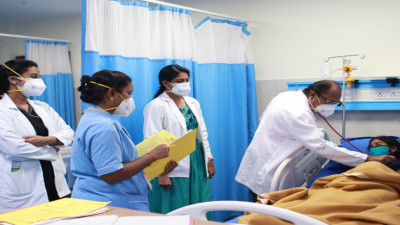India’s No. 1 Online Admission Portal Apply Now
India’s No. 1 Online Admission Portal Apply Now
Government
1804
Kazan, Russia
NMC, WHO
NMC, WHO
Kazan University is one of the oldest universities in Russia. On November 5, 1804, Alexander I signed the Affirmative Diploma of Kazan Imperial University and its Charter.
Initially, the university was located in the building of the Kazan Imperial Gymnasium, built-in 1796, later three neighbouring houses were purchased for the institution's needs, which made it possible to consider this quarter as the territory of the campus. In the 1920s, the architect P.G. Pyatnitsky erects the main building, the classic facade of which with three porticoes has been preserved to this day. In the next decade, when N.I. became the rector of the university Lobachevsky, under the leadership of the architect M.P. Corinthian architectural ensemble was created. The architect placed the anatomical theatre strictly along the axis of the main building, making it the southern dominant of the entire ensemble. Symmetrically, the buildings of the chemical laboratory and library got up; in the same period, an astronomical observatory and clinic were built.
In the XX century, the exit of university buildings beyond the original historical quarter became inevitable. The building of the former theological seminary, an architectural monument of the 18th century, housed the geological faculty, on the other side of Astronomical Street, the building of the chemical building grew in the 50s, and from the late 60s, in about ten years, two high-rise educational laboratory buildings were built - north and west of the main building. In 1989, the UNICS cultural and sports complex was put into operation, sports facilities were supplemented by the Bustan complex, which in May 2010 was inaugurated with the participation of the Prime Minister of Russia V.V. Putin. The construction in 2003, in preparation for the 200th anniversary of Kazan University, the east wing of the main building gave it completeness in accordance with the project of architect Mufke,
During the life and work of Kazan University, scientific schools that have received international recognition have been formed in it. Non-Euclidean geometry was born here, the creator of which was the mathematician N.I. Lobachevsky played an outstanding role in the development of the university, leading it for two decades.
In 1842, a graduate of the University, Professor N.N. Zinin, for the first time, synthesized aniline, thereby laying the foundations of the aniline-dye industry and the production of medicines. Two years later, in 1844, another Kazan scientist, K.K. Klaus discovered a new chemical element, which he named “ruthenium” in honour of Russia. Even more glorified Kazan chemical school A.M. Butlerov, creating a theory of the chemical structure of organic substances, which for the chemistry of organic compounds has the same meaning as the table D.I. Mendeleev to study the world of inorganic substances.
In the first half of the 19th century, the university became the largest centre of oriental studies in Europe; here was born the famous linguistic school founded by I.A. Baudouin de Courtenay. Among the poets and scientists, whose activities in many respects contributed to the world fame of the university, - astronomer I.M. Simonov, a participant in the first round-the-world expedition of 1819-1821, during which Antarctica was discovered and the beginning of its scientific study was laid. Within the walls of Kazan University A.F. Samoilov, the founder of the electrophysical school, for the first time in Russia recorded an electrocardiogram. The university is associated with the names of two chemical scientists - the father and son of the Arbuzovs, who created a new direction in science - the chemistry of organophosphorus compounds. In the midst of World War II, in 1944, E.K. Zavoisky made a fundamental scientific discovery - recorded the phenomenon of electron paramagnetic resonance, his research was continued by S.A. Altshuler, B.M. Kozyrev, other scientists who made up the largest school of magnetic radio spectroscopy and quantum electronics.
For more than 200 years of history, the university has given science eighty full members and corresponding members of the country's Academy of Sciences.
The university is a centre not only of science and scientific education but of culture and enlightenment, it is associated with the emergence of book publishing in the region, the appearance of the first provincial newspaper, the development of theatrical life and much more. At different times, the creator of the Soviet state V.I. studied at the university. Ulyanov-Lenin, writers S.T. Aksakov, L.N. Tolstoy, P.I. Melnikov-Pechersky, V.V. Khlebnikov, composer M.A. Balakirev, artist V.I. Jacobi et al.
By decree of the President of the Russian Federation B.N. Yeltsin on July 30, 1996, Kazan State University is included in the State Code of Especially Valuable Objects of Cultural Heritage of the Peoples of the Russian Federation.
In the execution of the Decree of the President of Russia D.A. Medvedev "On the establishment of federal universities in the North-West, Volga, Ural and Far Eastern Federal Districts" October 21, 2009, by order of the Government of the Russian Federation dated April 2, 2010, created the federal state autonomous educational institution of higher education "Kazan (Volga Federal) University" by changes in the type of the existing state educational institution of higher professional education “Kazan State University named after IN AND. Ulyanov-Lenin. "
A week later, on April 9, 2010, by the decree of the Government of the Russian Federation, Gafurov Ilshat Rafkatovich was appointed rector of the Kazan Federal University for a term of 5 years. By an order of the Government of the Russian Federation dated April 14, 2015, Ilshat Rafkatovich was re-appointed to the post of rector of KFU for the next five-year period.
Ministry of Health of the Russian
NMC, WHO
5
| Particulars | Year 1 | Year 2 | Year 3 | Year 4 | Year 5 | Year 6 |
| Tuition Fee (approx.) | 530,000 Ruble | 530,000 Ruble | 530,000 Ruble | 530,000 Ruble | 530,000 Ruble | 530,000 Ruble |
| Fees in Indian Rupees | Rs 5.30 | Rs 5.30 | Rs 5.30 | Rs 5.30 | Rs 5.30 | Rs 5.30 |
| Hostel Fees | 12000 Ruble | 12000 Ruble | 12000 Ruble | 12000 Ruble | 12000 Ruble | 12000 Ruble |
| Hostel Fee in Rupees (approx.) | Rs 12000 | Rs 12000 | Rs 12000 | Rs 12000 | Rs 12000 | Rs 12000 |
| Total Fees in Indian Rupees | Rs 5.42 | Rs 5.42 | Rs 5.42 | Rs 5.42 | Rs 5.42 | Rs 5.42 |
1 Ruble = Rs.1
***Interim fee for the session 2026-2027 and subject to change as per the guidelines of State Level Fee Determination Committee, Government of Tatarstan**.
Boys Hostel
Girls Hostel
Medical Facilities
Safety & Security
Sports
Wifi
Step 1 - Fill out the application form (apply online)
Step 2 - Attached are the documents given below-
Step 3 - After fulfilling all the conditions, students get an admission letter from the university.
Step 4 - After receiving the confirmation letter, a student should pay the fees through net banking and other payment methods.
Step 5 - As soon as after receive the invitation letter, a student should apply for a visa, and the university will mail you your visa invitation.
Step 6 - Once you receive a visa invitation, stamp your visa in the Embassy of the Russian Federation.
KFU has a vibrant Indian student community, providing a supportive environment for newcomers. Cultural events and festivals are celebrated, helping students feel at home.
Kazan experiences a continental climate with cold winters and warm summers. Students should be prepared for temperatures ranging from -10°C in winter to 25°C in summer.
Yes, Indian mess facilities are available at the university. Both vegetarian and non-vegetarian Indian meals are provided.
KFU provides well-furnished hostels with: Separate accommodation for boys and girls 24/7 security & CCTV surveillance Indian food (both veg & non-veg) available Wi-Fi, laundry, and study halls
Yes, a study gap is accepted, provided the student meets all other eligibility criteria.
No, KFU does not conduct any separate entrance exam. Admission is based on NEET score and academic qualifications.
Must have completed 10+2 (PCB) with at least 50% marks (40% for SC/ST/OBC). Must have qualified NEET (as per NMC regulations). Minimum age should be 17 years as of 31st December in the admission year.
The MBBS course at KFU is 6 years, including theoretical studies and clinical training.
For international students, MBBS is taught in English. However, students will also learn Russian for better communication during clinical practice.
Yes, KFU is recognized by the National Medical Commission (NMC, formerly MCI) and is also listed in the World Directory of Medical Schools (WDOMS).
1 Reviews
Academic
(5/5.0)
Faculty
(4/5.0)
Infra
(5/5.0)
Placements
(4/5.0)
Beautiful Infrastructure
Good Infrastructure and best education quality is provided.
No Question Found

Gazipur, Bangladesh | BMDC, NMC, WHO

Muzaffarpur | NMC, WHO

Paliganj, Patna | NMC

Syktyvkar, Komi Republic | NMC, WHO

Vladivostok, Primorsky Krai, Russia | NMC, WHO

Tambov, Tambov Oblast, Russia | NMC, WHO

21st March 2025

21st March 2025

11th July 2023

11th October 2025

17th March 2022

13th October 2025